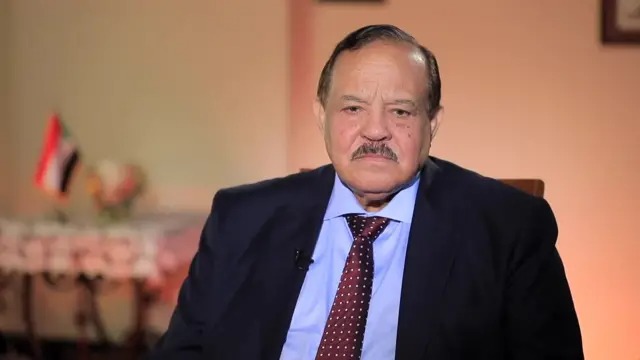The Dismissal of Port Sudan’s Foreign Minister
Is Al-Burhan’s authority beginning to disintegrate?

The dismissal of the de facto government’s Foreign Minister, Amb. Dr. Ali Yousef Al-Sharif, caused a ripple of shock through the Sudanese political circles, especially since he had only held the position for three months since his appointment in early November, succeeding Amb. Hussein Awad. This decision raised questions in regards to the reasons behind this rather sudden development.
This dismissal comes in the context of a series of dismissals of prominent officials at both the civilian and military levels since the outbreak of the conflict between the Sudanese Armed Forces (SAF) and the Rapid Support Forces (RSF) in mid-April (2023), reflecting the political and administrative instability currently gripping the country.
New Wave of Dismissals
Following the decision to dismiss Al-Sharif, media reports, citing informed sources, quickly circulated, predicting imminent decisions that included new dismissals in vital ministries such as Education, Health, Interior, Energy and Petroleum, as well as the Ministry of Commerce. Additionally, the imminent dismissals were predicted to include Governors of several states, such as the Red Sea, Northern, River Nile, Kassala, and El-Gedaref states.
Even though the majority of the Sudanese public are unaware of the names of those who hold these positions, given Al-Burhan and the Sudanese Army’s propensity to monopolize the appointments and dismissals decisions when it comes to the State’s executive branch, and even most decisions affecting Sudanese citizens after the outbreak of the war; many observers believe this development is an attempt to strengthen loyalties in the tense political landscape.
Posts by influential figures on social media indicated that the Foreign Minister’s dismissal came against the backdrop of media statements he made, in which he described the two parties to the conflict as “the two warring parties.” Al-Burhan and media circles loyal to the former regime considered this an unacceptable equating of the Sudanese Army with the Rapid Support Forces, a claim they strongly reject and seek to use to gain legitimacy and strip the other party of its legitimacy.
They cite the fact that the dismissed Foreign Minister of Port Sudan succeeded in regaining Sudan’s membership in the Intergovernmental Authority on Development (IGAD), an incident that was followed by Sudan’s subsequent request to suspend its membership. Some have described this as a prime example of the “narcissism” that characterizes the remnants of the former regime’s approach to communicating with regional and international institutions.
The position of Minister of Foreign Affairs, in particular, has witnessed frequent changes. In April (2024), Ali Al-Sadig was dismissed from his post without clear reasons being announced. However, speculation linked this to differences in views on the management of foreign affairs, especially given Al-Burhan’s tendency to monopolize opportunities of travel and representation of his government, as the latter is known in many circles as the “Port Sudan Authority” or the “de facto government.”
Civilian Dismissals
In the early stages of the conflict and its aftermath, decisions were issued to dismiss a number of ministers in the pre-war transitional government, in most cases without clear or detailed reasons being announced. Some viewed these dismissals as seizing an opportunity to clear the power centers of civilian forces, which later converged with the Rapid Support Forces by accommodating the Framework Agreement, which they viewed as an important aspect to yhe process of curbing the war and the influence of Islamists following the (October 25th, 2021) Coup supported by Al-Burhan.
Some sought to interpret these dismissals as structural changes imposed by the war and its impact on the duties of government institutions, while other analyses pointed to divergent positions on how to deal with the conflict and its impact on the duties of various ministries.
This particular period also witnessed the dismissal of officials from government institutions and agencies, including the heads and directors of several institutions and agencies. In some cases, unofficial reports linked these dismissals to accusations of corruption or dereliction of duty under the exceptional circumstances facing the country, however, these reasons weren’t officially confirmed in most cases. Amongst the most notable of these dismissals was the dismissal of Mubarak Ardol, the director of the Sudanese Mineral Resources Company. The decision was linked to Al-Burhan’s anger toward him following the circulation of extensive leaks containing deals, criticism, and mockery of Al-Burhan.
Militarization of the Scene
Within the military establishment, despite the media blackout surrounding its internal decisions, previous media reports indicated the dismissal or transfer of a number of military leaders. These decisions are often attributed to performance evaluations on the battlefield or differences in views regarding the management of military operations. Given the scarcity of official data confirming these dismissals or clarifying their reasons, a number of them were always explained by the routine procedures for referral to retirement.
A military source (who preferred to remain anonymous) revealed that one of the most significant measures taken in preparation for war at the military level was the one issued by Al-Burhan on (August 26th, 2022), to strengthen the Islamists’ influence within the Sudanese Army by granting them control over sensitive positions. This took place approximately eight months prior to the war. It was achieved through the transfer of approximately (20) senior officers within the Sudanese Army’s General Staff and High Command, followed by promotions to the rank of Major General amidst members of the 40th batch, which is considered one of the most important batches of the Islamist Movement within the Army. This followed the ousting of Mohamed Osman Munawar, Essam Karrar, and others at the time.
The source added that the 40th batch included a large percentage of members of the Islamist Movement, which strengthened their influence and control over divisions and sub-district commands. The military source emphasized that the Islamists continued to enjoy strong influence within the Sudanese Army and controlled sensitive positions, making it difficult to eliminate them. Al-Burhan is taking this into account, which renders him rather hesitant to take any steps to stop the war, as these officers don’t agree with such intentions.
Motives for the Dismissals
Analysts believe that the series of appointments and dismissals carried out by Al-Burhan reflects a state of confusion and a search for a safe haven, driven by his fear of the disastrous repercussions of the ongoing war and the potential conflicts of interest it would generate that could possibly threaten his personal security.
Political analyst, Ehab Al-Hassan told (Rhino) -news agency- that there are other reasons beyond the immediate political context that can be considered. He noted that the war has paralyzed or disrupted the duties of numerous government institutions, necessitating changes in officials to ensure the remaining operations are conducted more efficiently.
Ehab noted that political differences and conflicting views amongst the components of the war camp also have an impact, given the intense political polarization that preceded the war and worsened with its ignition. He suggested that differences in views on how to manage the crisis and deal with the various parties were likely the reason for the dismissal of some officials, in addition to the possibility of pressure from internal political forces allied with Al-Burhan that played a role in the dismissal decisions.
Implications and Indicators
For his part, political analyst, Omar Sufyan Salem told (Rhino) that numerous decisions issued by the de facto government always coincide with the emergence of a new statement by the Rapid Support Forces (RSF) or its Commander, 1st Lt. Gen. Mohamed Hamdan Daglo, in an attempt to divert attention from those statements and their subsequent effects, in order to distract public opinion.
Omar added that these repeated dismissals reflect the state of uncertainty rampant in the political and administrative landscape amongst Al-Burhan and his allies, the remnants of the former regime. He emphasized that these decisions negatively impact the workflow of institutions, and indicate the depth of the political crisis as well as the deep fissures within the power structures, both on civilian and military levels. The political analyst went on to note the struggle for influence and conflicting interests, as each party in the war camp seeks to strengthen its position and remove those it perceives as a threat or an obstruction of its agenda.
He believed that some of the dismissals represent an attempt by the current government to appease certain parties, whether regional or international powers, by removing figures deemed unacceptable to them, or by bringing in and appointing figures based on their loyalty and closeness to those powers. This is the case with the current Sudanese Ambassador to Egypt and his close relationship with them, and the dismissed Foreign Minister, who was appointed, according to numerous leaks, in response to the wishes of Cairo, where he continued to reside and perform his duties.
In general, regardless of the nature of these decisions and appointments, their frequency within a short period of time reflects the depth of the crisis facing the war camp leading the country at the moment. It points to the presence of internal conflicts, external pressures, a state of instability amidst the exposure of the falsity of victories on the ground, in addition to the continued political and media pressure exerted by the Rapid Support Forces, heralding the latter’s ability to expand the scope of the war. Which -in turn- means that the political and administrative authority of Al-Burhan is imminently collapsing.





